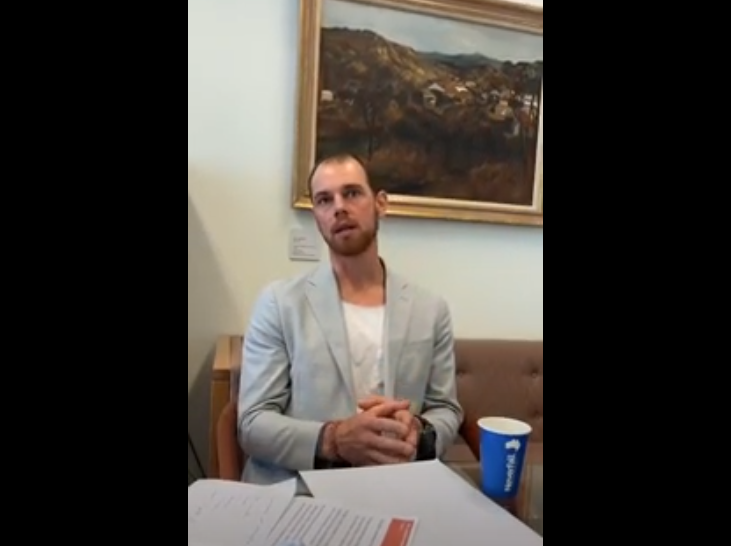
Charnwood-Dunlop School principal Rob Lans appears in the video alongside One Nation Senator Malcolm Roberts. Image: Screenshot.
An ACT school principal’s stand against mandatory vaccination against COVID-19 for school staff has thrown the spotlight on the growing number of ‘no jab, no job’ orders across the public and private sectors.
Charnwood-Dunlop School principal Rob Lans appeared with One Nation Senator Malcolm Roberts in a video posted on an anti-vaccination Facebook page.
Mr Lans spoke out against the public health order, saying it was coercive and violated his right to choose whether he is vaccinated or not.
The Education Directorate has since told parents that Mr Lans won’t be returning to school this week but “will be taking some time out of the workplace”.
While Mr Lans may have been unwise to connect himself with One Nation and the fringe anti-vaxxer group that hosted the video, his situation should concern anyone who professes to uphold civil liberties and human rights.
Vaccination is a medical intervention that, like most of them, is not risk-free, but comes down to a balance of risks and benefits. There are adverse events. It just comes down to whether the overall benefits outweigh them.
In the case of COVID-19, it is clear that without a defined treatment for the virus, vaccines are the best bet to control the pandemic and break the chain of debilitating lockdowns and social restrictions that have crippled societies and their economies across the world.
The death toll, ongoing illness and economic cost make for a compelling argument for vaccination, and it is understandable governments and businesses want to limit the risk of more damage.
In the ACT, the government understandably wants to protect higher-risk categories, such as children under 12 who cannot yet be vaccinated.
This risk management is colliding with the minority of people who feel they should have the right to take their chances and manage their own health.
It is an extension of the ‘no jab, no play’ controversy that embroiled child care settings, but on a broader scale.
Some governments have also adopted the requirements for vaccine passports or certificates to move freely about or receive services, something Chief Minister Andrew Barr has fiercely resisted.
He argues that it is too big a step to take to limit a person’s human rights, raises too many legal and compliance questions and that such actions have the potential to become permanent.
The same could be said of vaccine mandates, although at least in the ACT, there appears to be leeway for exemptions or redeployment to manage those who cannot comply for whatever reasons.
The ACT Human Rights Commission says public health directions around vaccine mandates should be based in legislation accompanied by a statement about its compatibility with human rights.
“It’s a very substantial limitation of rights to subject workforces to mandatory vaccination, so we would prefer that [in] legislative amendments,” Commissioner Dr Helen Watchirs told Budget estimates last week.
The mandates, time-limited though they may be, are infringements on our civil liberties that provide precedents for governments to interfere in the lives of its citizens, not so much a conspiracy as the good intentions that proverbially pave the road to hell.
Such coercive directions or laws should not be entered into lightly. They need to be framed carefully, have strict time limits, defined purposes and have the legislative guard-rails that prevent them from spreading into other areas of life.
The ACT’s mandates are tied to public health directions and will lapse with them, and Chief Health Officer Kerryn Coleman has said that when children are vaccinated it will be unlikely there will be a need for the schools one.
Dissident views such as those expressed by Mr Lans need to be respected and their proponents not vilified. They do not need to lose their employment and careers because of a principled or misguided stand, depending on your viewpoint.
The normalisation of coercive laws should not be entertained, just as the ongoing limits to our freedoms from anti-terror laws should not be accepted simply because the government wants to keep us safe.
It is hoped Mr Lans can return to his school when the situation has calmed and the ACT moves to some kind of normal with a vaccination rate close to 100 per cent.
If we can’t live with the 1 per cent who aren’t vaccinated, then the notion of living with the virus is meaningless.















